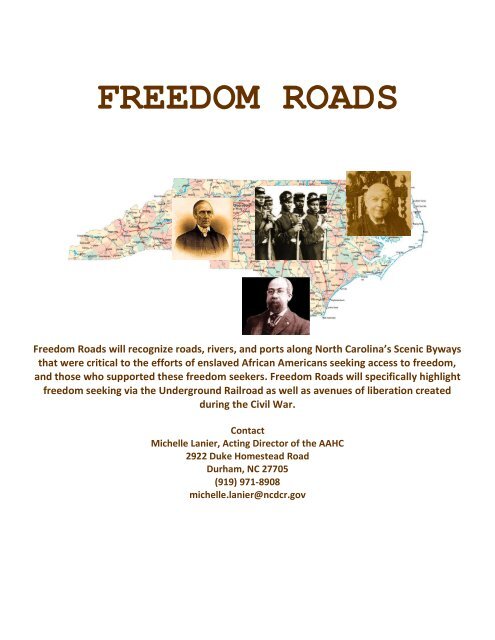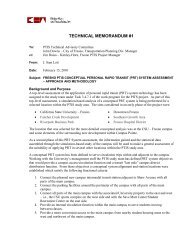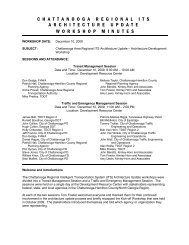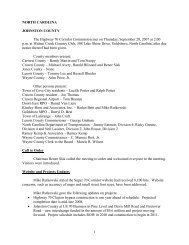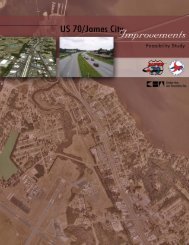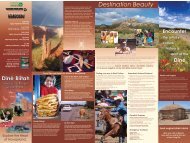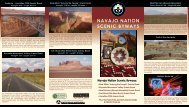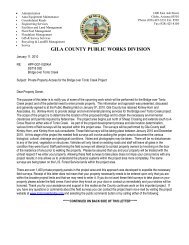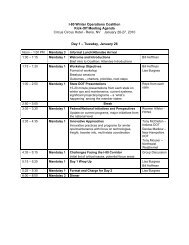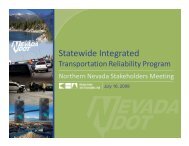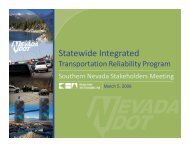Freedom Roads Info - Kimley-Horn and Associates, Inc.
Freedom Roads Info - Kimley-Horn and Associates, Inc.
Freedom Roads Info - Kimley-Horn and Associates, Inc.
You also want an ePaper? Increase the reach of your titles
YUMPU automatically turns print PDFs into web optimized ePapers that Google loves.
FREEDOM ROADS<br />
<strong>Freedom</strong> <strong>Roads</strong> will recognize roads, rivers, <strong>and</strong> ports along North Carolina’s Scenic Byways<br />
that were critical to the efforts of enslaved African Americans seeking access to freedom,<br />
<strong>and</strong> those who supported these freedom seekers. <strong>Freedom</strong> <strong>Roads</strong> will specifically highlight<br />
freedom seeking via the Underground Railroad as well as avenues of liberation created<br />
during the Civil War.<br />
Contact<br />
Michelle Lanier, Acting Director of the AAHC<br />
2922 Duke Homestead Road<br />
Durham, NC 27705<br />
(919) 971-8908<br />
michelle.lanier@ncdcr.gov
Proposed “<strong>Freedom</strong> <strong>Roads</strong>” Trail<br />
To commemorate routes used by freedom seeking African Americans from the antebellum<br />
period to the end of the Civil War<br />
“<strong>Freedom</strong> <strong>Roads</strong>” will recognize roads, rivers, <strong>and</strong> ports along North Carolina’s Scenic Byways* that<br />
were critical to the efforts of enslaved African Americans seeking access to freedom, <strong>and</strong> those<br />
who supported these freedom seekers. “<strong>Freedom</strong> <strong>Roads</strong>” will specifically highlight freedom<br />
seeking via the Underground Railroad as well as avenues of liberation created during the Civil<br />
War.<br />
This initiative is especially salient at this time, with the Sesquicentennial of the Civil War <strong>and</strong><br />
approaching 150 th anniversaries of both the Emancipation Proclamation <strong>and</strong> the 13 th Amendment,<br />
which abolished slavery in the U.S. The maritime <strong>and</strong> l<strong>and</strong> routes of “<strong>Freedom</strong> <strong>Roads</strong>” will lead to<br />
<strong>and</strong>/or link documented sites (see page 2**) with evidence of high <strong>and</strong>/or exceptional runaway<br />
activity, including colonial towns, ports, rivers, plantations, Quaker communities, Union<br />
occupied territories, contrab<strong>and</strong> camps, <strong>and</strong> freedmen’s colonies <strong>and</strong> settlements.<br />
Educationally, this program will complement new Civil War educational <strong>and</strong> interpretive materials that<br />
support the Department of Public Instruction curriculum guidelines. These materials were developed<br />
by the Department of Cultural Resources Division of State Historic Sites <strong>and</strong> history education<br />
experts.<br />
“<strong>Freedom</strong> <strong>Roads</strong>” will consist of on-line resources for travelers, signage for designated <strong>and</strong><br />
appropriate sites, temporary <strong>and</strong> permanent exhibits, <strong>and</strong> training <strong>and</strong> professional<br />
development opportunities for affiliate sites. The project will undertake complete design of<br />
temporary <strong>and</strong> permanent exhibits <strong>and</strong> display kiosks for utilization at Welcome Centers <strong>and</strong> up to<br />
five selected “<strong>Freedom</strong> <strong>Roads</strong>” locations. “<strong>Freedom</strong> <strong>Roads</strong>” will utilize social media <strong>and</strong> web-based<br />
platforms for marketing the project.<br />
Connecting thirteen (13) different Scenic Byways* across the state, this effort will ultimately become a<br />
free-st<strong>and</strong>ing trail system overseen by the African American Heritage Commission, which is a<br />
commission of the Department of Cultural Resources. (See enclosure for the guiding legislation for<br />
the African American Heritage Commission.) The project will utilize both in-house <strong>and</strong> contract<br />
expertise to complete the creation of the trail by 2015.<br />
* “<strong>Freedom</strong> <strong>Roads</strong>” include the following Scenic Byways that encompass documented transportation<br />
routes <strong>and</strong> sites used by sojourning freedom seekers <strong>and</strong> those who aided enslaved men, women,<br />
<strong>and</strong> children en route to freedom:<br />
1. Roanoke Voyages Corridor 8. Tar Heel Trace<br />
2. Football Road 9. Edenton-Windsor Loop<br />
3. North Durham Country Byway 10. Perquimans Crossing<br />
4. Blue-Gray Scenic Byway 11. Pamlico Scenic Byway<br />
5. Brunswick Town Road 12. Alligator River Route<br />
6. Cape Fear Historic Byway 13. French Broad Overview<br />
7. Lafayette’s Tour
Proposed “<strong>Freedom</strong> <strong>Roads</strong>” Trail<br />
To commemorate routes used by freedom seeking African Americans from the antebellum<br />
period to the end of the Civil War<br />
** “Documented sites include designations in the National Park Service’s Network to <strong>Freedom</strong> (NTF)<br />
Underground Railroad program as well as sites <strong>and</strong> routes recognized by historians <strong>and</strong>/or<br />
archaeologists. Several of the latter are in the process of seeking designation in the Network to<br />
<strong>Freedom</strong> program. Designated <strong>and</strong> potential sites <strong>and</strong> routes are:<br />
1. + Colonial Park at Historic Edenton State Historic Site (Harriet Jacobs Escape)— Edenton,<br />
North Carolina<br />
2. *^ Ft. Fisher State Historic Site—Kure Beach, North Carolina<br />
3. + Great Dismal Swamp<br />
4. *^# James City (“Trent River Settlement”)—New Bern, North Carolina<br />
5. ^ Mendenhall Plantation—Jamestown, North Carolina<br />
6. +# Neuse River<br />
7. + New Garden (Guilford College)—Greensboro, North Carolina<br />
8. + Old Town of Halifax at Historic Halifax State Historic Site—Halifax, North Carolina<br />
9. *+ Orange Street L<strong>and</strong>ing— Wilmington, North Carolina<br />
10. + Pasquotank River<br />
11. #^ “<strong>Freedom</strong> Hill” Princeville, North Carolina<br />
12. + Rich Square, North Carolina<br />
13. #*+ Roanoke Isl<strong>and</strong> Freedmen’s Colony at Ft. Raleigh National Historic Site—Manteo,<br />
North Carolina<br />
14. + Roanoke River<br />
15. + Snow Camp, North Carolina<br />
16. + Somerset Place State Historic Site—Creswell, North Carolina<br />
17. ^ Stagville State Historic Site—Durham, North Carolina<br />
18. #^ Tar-Pamlico River<br />
19. *Goldsboro<br />
20. *Plymouth<br />
21. *+Elizabeth City<br />
22. *The Lower Cape Fear River<br />
23. #Brunswick Town/Ft. Anderson<br />
24. *Kinston<br />
25. ^Washington<br />
26. *Asheville<br />
*=U.S. Colored Troops or U.S. Navy Presence<br />
#=Civil War-Era Freedmen’s/Contrab<strong>and</strong> Settlement<br />
+=NPS Network to <strong>Freedom</strong> Sites<br />
^=Potential sites with documented freedom seeking history
Proposed “<strong>Freedom</strong> <strong>Roads</strong>” Trail<br />
To commemorate routes used by freedom seeking African Americans from the antebellum<br />
period to the end of the Civil War<br />
MPOs:<br />
1. Wilmington MPO (William Gould’s Escape into Union Navy, Escapes using the Cape<br />
Fear, U.S. Colored Troops at 2 nd Battle of Ft. Fisher, Escape Behind Union Lines,<br />
Ongoing Presence of U.S. Colored Troops)<br />
2. Goldsboro MPO (U.S. Colored Troops Occupation)<br />
3. High Point MPO (Abolitionist Quaker Supporters of <strong>Freedom</strong> Seekers)<br />
4. Greensboro MPO (New Garden Abolitionist Quakers <strong>and</strong> Supporters of <strong>Freedom</strong><br />
Seekers)<br />
5. Burlington-Graham MPO (Abolitionist Activity)<br />
6. Durham-Chapel Hill-Carrboro MPO (Walker family Seeks <strong>Freedom</strong>)<br />
7. French Broad River MPO (presence of 1 st U.S. Colored Heavy Artillery <strong>and</strong><br />
Recruitment, story of former slave, freedom seeking behind Union lines, <strong>and</strong> USCT<br />
George Avery)<br />
RPOs:<br />
1. Albemarle RPO (the Harriet Jacobs story at Colonial Park at Historic Edenton, <strong>Freedom</strong><br />
Seekers’ maroon colonies in the Great Dismal Swamp, Roanoke Isl<strong>and</strong> Freedmen’s<br />
Colony, Resistance to Slavery at Somerset Place, U.S. Colored Troops at the Battle of<br />
Plymouth, U.S. Colored Troops Recruitment <strong>and</strong> Enlistment (Ex: Elizabeth City)<br />
Substantial <strong>Freedom</strong> Seeking Activity)<br />
2. Down East RPO (James City/Trent River Freedmen’s Camp, Abraham Galloway, U.S.<br />
Colored Troops Recruitment at New Bern, Substantial <strong>Freedom</strong> Seeking Activity)<br />
3. Eastern Carolina RPO (U.S. Colored Troops Recruitment <strong>and</strong> Enlistment, U.S. Colored<br />
Troops Military Presence, U.S. Colored Troops Occupation in areas surrounding<br />
Goldsboro)<br />
4. Upper Coastal Plain RPO (Encampment/Settlement for <strong>Freedom</strong> Seekers During Civil<br />
War, <strong>Freedom</strong> Seeking)<br />
5. Peanut Belt RPO (Substantial <strong>Freedom</strong> Seeking Activity, Abolitionist Activity)<br />
6. Kerr-Tar RPO (<strong>Freedom</strong> Seeking)<br />
7. Cape Fear RPO (Escape Behind Union Lines, Ongoing Presence of U.S. Colored<br />
Troops, Contrab<strong>and</strong>/Freedmen’s Encampment)<br />
8. Mid-East RPO (Union Military Action by African Americans)
“<strong>Freedom</strong> <strong>Roads</strong>” Endorsement<br />
We, the<br />
RPO*, formally offer our<br />
endorsement of the “<strong>Freedom</strong> <strong>Roads</strong>” trails program. We acknowledge that<br />
“<strong>Freedom</strong> <strong>Roads</strong>” will recognize roads, rivers, <strong>and</strong> ports along North<br />
Carolina’s Scenic Byways that were critical to the efforts of enslaved African<br />
Americans seeking access to freedom, <strong>and</strong> those who supported these freedom<br />
seekers. “<strong>Freedom</strong> <strong>Roads</strong>” will specifically highlight freedom seeking via the<br />
Underground Railroad as well as avenues of liberation created during the Civil<br />
War. We are aware that the “<strong>Freedom</strong> <strong>Roads</strong>” program is not requesting<br />
funds from RPOs; rather, the “<strong>Freedom</strong> <strong>Roads</strong>” will support economic growth<br />
in communities through heritage tourism opportunities along North Carolina’s<br />
Scenic Byways.<br />
Signature<br />
____________________________<br />
Date<br />
RPO Representative<br />
______________________________<br />
RPO Name*<br />
Please mail to:<br />
The North Carolina African-American Heritage Commission<br />
2922 Duke Homestead Road<br />
Durham, N.C. 27705<br />
Or<br />
E-mail a scanned copy to:<br />
michelle.lanier@ncdcr.gov
Who are we?<br />
The North Carolina Legislature established the North Carolina African American Heritage Commission<br />
effective October 1, 2008. We are legislated to “assist the Secretary of Cultural Resources in the preservation,<br />
interpretation, <strong>and</strong> promotion of African-American history, arts, <strong>and</strong> culture.”<br />
The Commission was officially launched in 2009 <strong>and</strong> is made up of ten (10) appointed members from across the<br />
state <strong>and</strong> two (2) Ex-Officio members. Support is received from one (1) staff member within the Department of<br />
Cultural Resources, who serves as both the Acting Director of the African American Heritage Commission as<br />
well as Curator of Multicultural Initiatives for the Division of State Historic Sites <strong>and</strong> Properties.<br />
VISION:<br />
To transform <strong>and</strong> enrich people <strong>and</strong> communities by sharing North Carolina’s African American history, arts,<br />
<strong>and</strong> culture.<br />
MISSION:<br />
To preserve, protect, <strong>and</strong> promote North Carolina’s African American history, arts, <strong>and</strong> culture for all people.<br />
What do we do?<br />
For Fiscal Year 2011-2012, the commission is currently involved in the following initiatives:<br />
1) We are the Official host of the N.C. African American Cultural Celebration, (partnering with the Museum of<br />
History, a DCR entity).<br />
2) We are a partner with the N.C. Arts Council (a DCR entity) in the ongoing development of the N.C. African<br />
American Music Trail.<br />
3) We partnered with the several divisions of the Office of Archives <strong>and</strong> History (DCR entities) to present a<br />
weeklong Teachers Institute focusing on bringing African American history <strong>and</strong> heritage into the classroom.<br />
4) We are in the process of working with NC DOT on the potential development of the “<strong>Freedom</strong> <strong>Roads</strong>” trails<br />
initiative.<br />
5) We are working with students from both NCCU's History Department <strong>and</strong> UNC-Chapel Hill's School of<br />
Government.<br />
6) We continue to work as a liaison organization between DCR <strong>and</strong> the NPS Gullah-Geechee Cultural Heritage<br />
Corridor.<br />
7) We continue to work in support of the development of NPS Network to <strong>Freedom</strong>, Underground Railroad<br />
designations in N.C.<br />
8) We continue to support Civil War 150 commemoration initiatives (a DCR initiative).<br />
9) We continue to support the Division of Historic Sites in a number of programming <strong>and</strong> promotional ways,<br />
including the distribution of the poster "Journeys Toward <strong>Freedom</strong>" (a DCR effort).<br />
10) We have begun to work in concert with the State Preservation Office to raise awareness <strong>and</strong> promote the<br />
history <strong>and</strong> legacy of our state’s Rosenwald Schools, particularly as North Carolina has the most Rosenwald<br />
Schools of any state in the nation.
SESSION LAW 2008-107<br />
HOUSE BILL 2436<br />
ESTABLISH AFRICAN-AMERICAN HERITAGE COMMISSION<br />
SECTION 19A.2. Article 2 of Chapter 143B of the General Statutes is amended by adding a new Part to read:<br />
"Part 30. African-American Heritage Commission.<br />
"§ 143B-135. Commission established.<br />
(a) Creation <strong>and</strong> Duties. – There is created the African-American Heritage Commission in the Department<br />
of Cultural Resources to advise <strong>and</strong> assist the Secretary of Cultural Resources in the preservation, interpretation,<br />
<strong>and</strong> promotion of African-American history, arts, <strong>and</strong> culture. The Commission shall have the following powers<br />
<strong>and</strong> duties:<br />
(1) To advise the Secretary of Cultural Resources on methods <strong>and</strong> means of preserving African-American<br />
history, arts, <strong>and</strong> culture.<br />
(2) To promote public awareness of historic buildings, sites, structures, artwork, <strong>and</strong> culture associated with<br />
North Carolina's African-American heritage through special programs, exhibits, <strong>and</strong> publications.<br />
(3) To support African-American heritage education in elementary <strong>and</strong> secondary schools in coordination<br />
with North Carolina Public Schools.<br />
(4) To build a statewide network of individuals <strong>and</strong> groups interested in the preservation of<br />
African-American history, arts, <strong>and</strong> culture.<br />
(5) To develop a program to catalog, preserve, assess, <strong>and</strong> interpret all aspects of African-American history,<br />
arts, <strong>and</strong> culture.<br />
(6) To advise the Secretary of Cultural Resources upon any matter the Secretary may refer to it.<br />
(b) Composition <strong>and</strong> Terms. – The Commission shall consist of 10 members who shall serve staggered<br />
terms. The initial board shall be selected on or before October 1, 2008, as follows:<br />
(1) Four appointed by the Governor, two of whom shall serve terms of three years, one of whom shall serve<br />
a term of two years, <strong>and</strong> one of whom shall serve a term of one year. At least one appointee shall be a member<br />
of the North Carolina Historical Commission.<br />
(2) Three appointed by the General Assembly upon the recommendation of the President Pro Tempore of<br />
the Senate, one of whom shall serve a term of three years, one of whom shall serve a term of two years, <strong>and</strong> one<br />
of whom shall serve a term of one year.
SESSION LAW 2008-107 (CONTD.)<br />
HOUSE BILL 2436<br />
ESTABLISH AFRICAN-AMERICAN HERITAGE COMMISSION<br />
(3) Three appointed by the General Assembly upon the recommendation of the Speaker of the House of<br />
Representatives, one of whom shall serve a term of three years, one of whom shall serve a term of two years,<br />
<strong>and</strong> one of whom shall serve a term of one year.<br />
Upon the expiration of the terms of the initial Commission members, each member shall be appointed for a<br />
three-year term <strong>and</strong> shall serve until a successor is appointed.<br />
(c) Vacancies. – A vacancy shall be filled in the same manner as the original appointment, except that all<br />
unexpired terms appointed by the General Assembly shall be filled in accordance with G.S. 120-122.<br />
Appointees to fill vacancies shall serve the remainder of the unexpired term <strong>and</strong> until their successors have been<br />
duly appointed <strong>and</strong> qualified.<br />
(d) Removal. – The Commission may remove any of its members for neglect of duty, incompetence, or<br />
unprofessional conduct. A member subject to disciplinary proceedings shall be disqualified from participating<br />
in the official business of the Commission until the charges have been resolved.<br />
(e) Officers. – The chair shall be designated by the Governor from among the members of the Commission<br />
to serve as chair at the pleasure of the Governor. The Commission shall elect annually from its membership a<br />
vice-chair <strong>and</strong> other officers deemed necessary by the Commission to carry out the purposes of this Article.<br />
(f) Meetings; Quorum. – The Commission shall meet at least semiannually to conduct business. The Board<br />
shall establish the procedures for calling, holding, <strong>and</strong> conducting regular <strong>and</strong> special meetings. A majority of<br />
Commission members shall constitute a quorum.<br />
(g) Compensation. – The Commission members shall receive no salary as a result of serving on the<br />
Commission but shall receive per diem, subsistence, <strong>and</strong> travel expenses in accordance with the provisions of<br />
G.S. 120-3.1, 138-5, <strong>and</strong> 138-6, as applicable."


